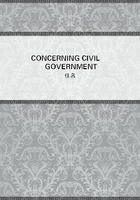
第38章
Of the Subordination of the Powers of the Commonwealth 149. THOUGH in a constituted commonwealth standing upon its own basis and acting according to its own nature- that is, acting for the preservation of the community, there can be but one supreme power, which is the legislative, to which all the rest are and must be subordinate, yet the legislative being only a fiduciary power to act for certain ends, there remains still in the people a supreme power to remove or alter the legislative, when they find the legislative act contrary to the trust reposed in them. For all power given with trust for the attaining an end being limited by that end, whenever that end is manifestly neglected or opposed, the trust must necessarily be forfeited, and the power devolve into the hands of those that gave it, who may place it anew where they shall think best for their safety and security. And thus the community perpetually retains a supreme power of saving themselves from the attempts and designs of anybody, even of their legislators, whenever they shall be so foolish or so wicked as to lay and carry on designs against the liberties and properties of the subject. For no man or society of men having a power to deliver up their preservation, or consequently the means of it, to the absolute will and arbitrary dominion of another, whenever any one shall go about to bring them into such a slavish condition, they will always have a right to preserve what they have not a power to part with, and to rid themselves of those who invade this fundamental, sacred, and unalterable law of self-preservation for which they entered into society. And thus the community may be said in this respect to be always the supreme power, but not as considered under any form of government, because this power of the people can never take place till the government be dissolved.
150. In all cases whilst the government subsists, the legislative is the supreme power. For what can give laws to another must needs be superior to him, and since the legislative is no otherwise legislative of the society but by the right it has to make laws for all the parts, and every member of the society prescribing rules to their actions, they are transgressed, the legislative must needs be the supreme, and all other powers in any members or parts of the society derived from and subordinate to it.
151. In some commonwealths where the legislative is not always in being, and the executive is vested in a single person who has also a share in the legislative, there that single person, in a very tolerable sense, may also be called supreme; not that he has in himself all the supreme power, which is that of law-making, but because he has in him the supreme execution from whom all inferior magistrates derive all their several subordinate powers, or, at least, the greatest part of them; having also no legislative superior to him, there being no law to be made without his consent, which cannot be expected should ever subject him to the other part of the legislative, he is properly enough in this sense supreme. But yet it is to be observed that though oaths of allegiance and fealty are taken to him, it is not to him as supreme legislator, but as supreme executor of the law made by a joint power of him with others, allegiance being nothing but an obedience according to law, which, when he violates, he has no right to obedience, nor can claim it otherwise than as the public person vested with the power of the law, and so is to be considered as the image, phantom, or representative of the commonwealth, acted by the will of the society declared in its laws, and thus he has no will, no power, but that of the law. But when he quits this representation, this public will, and acts by his own private will, he degrades himself, and is but a single private person without power and without will; the members owing no obedience but to the public will of the society.
152. The executive power placed anywhere but in a person that has also a share in the legislative is visibly subordinate and accountable to it, and may be at pleasure changed and displaced; so that it is not the supreme executive power that is exempt from subordination, but the supreme executive power vested in one, who having a share in the legislative, has no distinct superior legislative to be subordinate and accountable to, farther than he himself shall join and consent, so that he is no more subordinate than he himself shall think fit, which one may certainly conclude will be but very little. Of other ministerial and subordinate powers in a commonwealth we need not speak, they being so multiplied with infinite variety in the different customs and constitutions of distinct commonwealths, that it is impossible to give a particular account of them all. Only thus much which is necessary to our present purpose we may take notice of concerning them, that they have no manner of authority, any of them, beyond what is by positive grant and commission delegated to them, and are all of them accountable to some other power in the commonwealth.